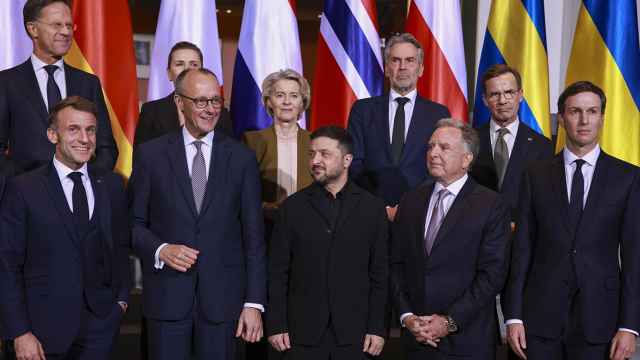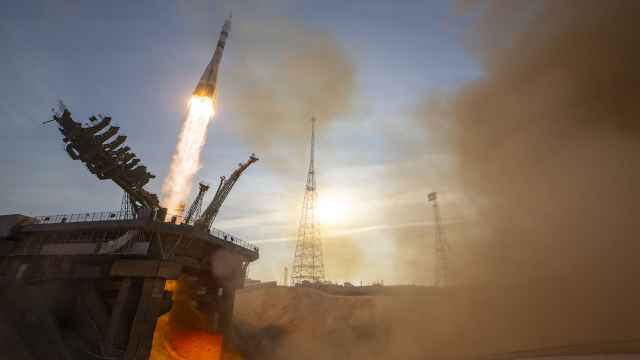LISBON, Portugal — NATO agreed on Saturday to hand control of security in Afghanistan to Afghan forces by the end of 2014 and said the NATO-led force could halt combat operations by the same date if security conditions were good enough.
Some NATO officials fear a rise in violence could make it hard to meet the target date set by Afghan President Hamid Karzai for the security handover, which would leave a vastly reduced number of foreign troops in a training and support role.
But U.S. President Barack Obama lifted hopes the target date would be met by saying for the first time that his aim was to halt major U.S. combat operations by the end of 2014 and significantly reduce the number of U.S. troops there.
"Today marks the beginning of a new phase in our mission in Afghanistan," NATO Secretary-General Anders Fogh Rasmussen told an alliance summit in Lisbon attended by the Afghan president and 48 countries with troops in Afghanistan.
"I don't foresee ISAF [International Security Assistance Force] troops in a combat role beyond 2014, provided of course that the security situation allows us to move into a more supportive role."
Senior U.S. officials had raised doubts about the target for the end of combat operations, saying Obama would decide when the U.S. combat mission ends only after completed a review of the war. But the president later said he shared the NATO aim.
"My goal is to make sure that by 2014 we have transitioned, Afghans are in the lead, and it is a goal to make sure we are not still engaged in combat operations of the sort we are involved in now," Obama told a news conference.
Karzai said he also believed the handover, starting early next year, could be completed by the end of 2014 "because I found today strong commitment by the international community."
United Nations Secretary-General Ban Ki-moon said, however, the handover must be shaped by the security situation and not by timetables. "There are no short cuts to peace," he said.
Obama said counter-terrorism operations against al-Qaida in the region were likely to continue after 2014. About 90,000 of the 130,000 ISAF troops are American and there are more than 20,000 other U.S. soldiers based in Afghanistan.
Rasmussen said the new strategy did not mean all 150,000 foreign troops in Afghanistan would leave by the end of 2014 and said NATO would not abandon the government.
"If the enemies of Afghanistan have the idea that they can just wait it out until we leave, they have the wrong idea," he said.
The Afghan conflict is widely seen as going badly for the United States and NATO. Obama was stung by criticism last year that he was jeopardizing the lives of U.S. soldiers by announcing U.S. troops would begin withdrawing in July 2011.
Critics said setting the date would embolden the Taliban and the White House had been careful to refer to 2014 only as the date when Afghans would finally take the lead in security rather than as a target for the end of the U.S. combat mission.
Many countries' leaders face voter pressure to withdraw troops gradually as casualties and costs rise.
Despite the problems, Obama, who ordered 30,000 more troops to Afghanistan last year, said he believed NATO forces were making progress in blunting the momentum of the Taliban.
Security analysts, however, have questioned the upbeat assessments of U.S. military officials, saying they appear designed to influence U.S. public opinion.
The U.S.-led intervention in Afghanistan began in response to the Sept. 11, 2001, attacks. The United States and its allies invaded to overthrow the then-ruling Taliban, who had refused to hand over al-Qaida leader Osama bin Laden.
More than 2,200 foreign troops have since been killed there. The withdrawal strategy hinges on efforts to build up Afghan forces so they can contain the insurgency.
The Kabul government is widely seen as too corrupt, unstable and inept to survive long without foreign military support.
NATO enlisted the support of Russia during talks in Lisbon with President Dmitry Medvedev, who agreed to expand an agreement to allow equipment to go through Russian territory to Afghanistan.
Thousands of anti-NATO protesters marched peacefully through Lisbon on Saturday and police detained several dozen activists who blocked a road to the military alliance's summit venue. There were no reports of violence.
A Message from The Moscow Times:
Dear readers,
We are facing unprecedented challenges. Russia's Prosecutor General's Office has designated The Moscow Times as an "undesirable" organization, criminalizing our work and putting our staff at risk of prosecution. This follows our earlier unjust labeling as a "foreign agent."
These actions are direct attempts to silence independent journalism in Russia. The authorities claim our work "discredits the decisions of the Russian leadership." We see things differently: we strive to provide accurate, unbiased reporting on Russia.
We, the journalists of The Moscow Times, refuse to be silenced. But to continue our work, we need your help.
Your support, no matter how small, makes a world of difference. If you can, please support us monthly starting from just $2. It's quick to set up, and every contribution makes a significant impact.
By supporting The Moscow Times, you're defending open, independent journalism in the face of repression. Thank you for standing with us.
Remind me later.





